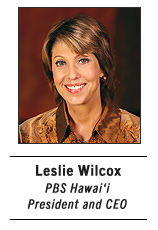The PBS Hawaiʻi Livestream is now available!
PBS Hawaiʻi Live TV
If you’d like to help support public media organizations like PBS Hawai‘i:
|
 At first, when Ronald Reagan launched his Presidency in 1981, he didn’t like the idea of federal monies going to fund PBS and NPR stations across the country.
At first, when Ronald Reagan launched his Presidency in 1981, he didn’t like the idea of federal monies going to fund PBS and NPR stations across the country.
Then he saw how public-service media stations leveraged a relatively small amount of federal funding to gain private donations. One federal dollar might turn into, say, eight dollars, with citizens, businesses and charitable foundations adding the weight of their support.
“Government should provide the spark and the private sector should do the rest,” President Reagan said.
We at PBS Hawai‘i believe this is a good public-private partnership, centered on education, public safety and civic leadership. Last year, 9.5 percent of our revenues came from the federal investment.
Now comes the Trump Administration, signaling its intention to “privatize” – meaning de-fund – the Corporation for Public Broadcasting, the private nonprofit that distributes funds to public media stations. Other Administration targets are the National Endowment for the Arts and the National Endowment for the Humanities.
As I write this, two weeks before publication, I’m getting ready to go to Washington, D.C. for a national public media summit, at which attendees will seek to determine President Trump’s plans. Is he really going to wage a battle against federal seed money for public broadcasting?
The public broadcasting community says the notion of eliminating the federal funding in its mission is “nothing new.” It points out that similar ideas have been “soundly rejected on a bipartisan basis.”
According to the industry publication Current, the chair of a key House Appropriations subcommittee, Rep. Tom Cole (R-Okla.), predicts that such a move would fail because “there is a strong constituency for public broadcasting in both the House and Senate.”
Indeed, strong bipartisan support usually results in an appropriation of about $1.35 per year per American. Still, leaders of public broadcasting say they must take funding threats seriously. They’re asking to talk with Administration officials, and station general managers from all over the country are taking their case to Capitol Hill.
PBS Hawai‘i’s Board of Directors already has written to Hawai‘i’s Congressional delegates.
However, America’s Public Television Stations (APTS) isn’t calling out and mobilizing citizens at this time. Without a fleshed-out proposal from the Trump Administration, leaders are monitoring the situation closely. We are urging viewers to register your support at protectmypublicmedia.org.
Aloha a hui hou,

